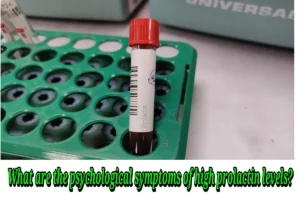I hope all are doing great. Today we will discuss the psychological symptoms of high prolactin levels.
We have previously discussed the emotional symptoms of high prolactin. If you want, you can see that post. So let’s start today’s post without further ado.
Table of Contents
Psychological Symptoms of High Prolactin Levels :
A high prolactin level is called hyperprolactinemia. Hyperprolactinemia can lead to a variety of psychological symptoms, including:

- Depression: Elevated prolactin levels can contribute to feelings of sadness and depression.
- Anxiety: Patients suffering from hyperprolactinemia often feel anxiety or nervousness.
- Mood swings: May cause mood swings and irritability, due to high prolactin or hormonal imbalance.
- Cognitive changes: Due to an increase in prolactin levels, memory problems may occur.
- Decreased libido: Hyperprolactinemia can cause decreased sexual desire or sexual dysfunction.
- Stress and emotional disturbances: Due to high prolactin, individuals may experience emotional stress and disturbances.
- Fatigue: High prolactin can cause chronic fatigue and lack of energy.
Diagnosis and treatment
Diagnosis:
- Medical History and Physical Examination: The doctor will take your medical history and perform a physical examination to assess your overall health and possible problems.
- Blood Tests: A blood test will be done to measure your prolactin levels. This test is known as the prolactin test. Also can do some more test advice with it.
- Imaging: If high prolactin levels are confirmed, the doctor may recommend an MRI (magnetic resonance imaging) test of the brain to check for abnormalities or tumors of the pituitary gland.
Treatment:
Hyperprolactinemia depends on the underlying cause and severity of symptoms. The following are the common methods of Hyperprolactinemia treatment:
1. Addressing the underlying causes:
- Medication-Induced: If medication is the cause of prolactin elevation, the doctor may adjust your medication or recommend an alternative regimen.
- Pituitary Tumor: Doctors may recommend medication to shrink the tumor or surgery to remove it as treatment options for pituitary tumors.
2. Monitoring: If hyperprolactinemia is mild and does not cause significant signs or symptoms, the doctor may choose to monitor your prolactin levels over time without immediate treatment.
3. Lifestyle Changes: In some cases, adopting a healthy lifestyle, managing stress, and getting enough sleep can help relieve hyperprolactinemia symptoms and improve overall well-being.
Conclusion:
Prolactin levels can be high or low depending on various factors. However, without worrying about that, you should consult your doctor.
That’s it for today’s post. If you like our post, you can visit our Facebook page oviggobd. Thank you for reading this post.
নতুন কিছু শিখতে চাই এবং সেখাতে চাই । অনভিজ্ঞও থেকে আপনিও হয়ে উঠুন অভিজ্ঞ।